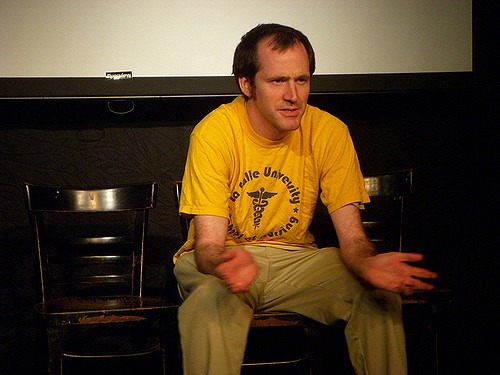For more than 10 years, I’ve moonlighted as a stand-up comedian. (And I do mean moonlighted, having sat patiently at open mics into the wee hours of the night just to tell jokes for three minutes.) Having worked as a journalist or PR professional by day, I’d invest my spare time by night trying to make strangers laugh. And, while I’m mostly a local performer in Philadelphia, I have managed to open for some really big names, including Hasan Minhaj, who hosted this year’s White House Correspondents’ Dinner.
Performing comedy is an insane amount of fun. But getting up on stage has done more than satisfy my passion for laughter. It has helped me develop many skills that translate incredibly well into public relations. In fact, I don’t think I would have any success in PR without my comedy experience. Here’s what I’ve learned:
KNOW YOUR AUDIENCE.
Comedians quickly learn there are different types of audiences and accordingly tailor their material to the crowd. Most of my shows take place at all-ages theaters that attract a younger and more “hipster” type of crowd. This demographic differs wildly from what one would expect at a big comedy club or a small show in the suburbs.
Public relations is not much different. Pitching a client for a TV appearance on CNBC takes a different approach than attempting to earn a placement in the Wall Street Journal. Sometimes, a client’s product or service might actually be a better fit for a smaller trade outlet than a nationally known publication, which requires its own unique angle. But either way, a good PR person has to understand which outlet to approach and the best way to do so. Comedy and PR both require an understanding of the differences between those audiences. Not knowing how to adjust to each audience results in a comedian bombing or a media pitch going unread.
UNDERSTAND THE IMPORTANCE OF STRATEGY.
Comedians cannot fly blind on a stage. When developing material, a comedian must know their voice and know what they want to say. When I was new to performing comedy, I had jokes and ideas, but they had no connectivity. There was no story or strategy to what I was doing. Some jokes worked, some jokes didn’t. But the overall package was forgettable. It took some time for me to pick up on having a strategy and message behind what I said on stage, as opposed to reciting a series of jokes without any real organization.

There was no story or strategy to what I was doing. Some jokes worked, some jokes didn’t. But the overall package was forgettable. It took some time for me to pick up on having a strategy and message behind what I said on stage, as opposed to reciting a series of jokes without any real organization.
Public relations requires the same strategic messaging. When I started in public relations, I fired off emails to reporters who write about the topics in my client’s line of work. Sometimes this worked. Sometimes it didn’t. But as I gained experience, I learned the importance of developing a strategy and an approach. Our goal in PR is to tell the story of our clients, not merely to have our clients mentioned in articles. We can’t tell that story without some forethought and planning first.
YOU WILL FAIL.
Bombing happens all of the time in comedy. Even the greatest comics of all time have horror stories about their struggles on stage. One of the worst feelings a human being can experience is to face a crowd that stares at you instead of laughing. But good comics learn from their mistakes and what went wrong. Bombing forces you to revisit your writing and your approach. Failing on stage leads to learning offstage.
PR requires the same ability to learn from mistakes. It’s disheartening to send what you thought was a great pitch to media outlets who do not respond with anything besides a quick “no thanks.” But it happens, even to the best of firms. Sound media relations professionals take a step back when struggling with a pitch and ask what isn’t working. We dissect pitches and discover how we can improve. That constant search to do better separates good PR professionals from the pack.
Whether you are an aspiring stand-up comedian or PR pro, knowing your audience, strategizing, and learning from your mistakes is essential to mastering your craft.
